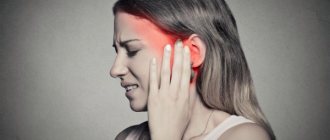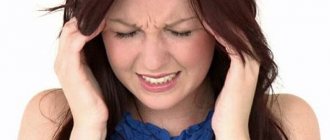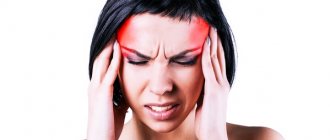Causes of pain
A headache that spreads to the skin at the roots of the hair is a characteristic sign of fungal, bacterial, metabolic diseases, as well as an allergic reaction to external irritants. Some people have highly sensitive skin, so they are more susceptible to such manifestations. Diagnostic results may reveal disorders that require an individual treatment regimen.
Skin diseases
Pain that intensifies when you touch the scalp is a typical symptom of skin diseases. They can be triggered by a fungal or bacterial infection, metabolic disorders and other factors. Most diseases present with similar symptoms. The patient presents with problems such as itching in the scalp, redness of the skin, the appearance of microdamages and rashes. It is possible to determine what caused these symptoms only based on test results.
Psoriasis
Psoriasis is a chronic disease of autoimmune origin. Its main cause is a disruption of the immune system, which leads to the appearance of inflammatory lesions on the skin. The disease can manifest itself on any part of the body, including the head. Its characteristic symptoms:
- the appearance of voluminous spots that connect with each other and form plaques;
- itching, inflammation of the skin;
- relapsing course, with alternating periods of remission and relapses;
- in some cases - joint damage.
The disease can occur with varying degrees of severity, even in one patient. Relapses are often triggered by changes in weather conditions, stress, disruption of the daily routine and concomitant diseases. It is important that psoriasis is not transmitted through household, contact, or airborne transmission.
Seborrheic dermatitis
Seborrhea is a skin disease that is characterized by scaling, inflammation, flaking, itching and pain. The scalp is a typical location because there are a large number of sebaceous glands. Seborrheic dermatitis often occurs in children and adolescents, as well as in older adults. Its appearance is associated with disruption of the skin glands, diseases of the immune system, as well as with the vital processes of a fungal infection.
Seborrheic dermatitis of the scalp occurs more often in those with oily skin. To reduce its manifestations, it is recommended to choose suitable care products, normalize your diet and sleep schedule. Your doctor may also prescribe antifungal medications if seborrhea is caused by an increased activity of a fungal infection.
Violation of innervation and blood circulation
If your scalp often hurts, itching and discomfort appear, you should consult a neurologist. This symptom may be associated with the high sensitivity of nerve endings located in the scalp area. Discomfort increases when touching the skin, combing the hair and while caring for it. Doctors recommend massage and, if necessary, sedatives based on herbal extracts.
Poor blood circulation in the scalp can be caused by mechanical factors. The blood vessels are compressed if you wear hats that do not fit properly, or use bulky hairpins. Lovers of high hairstyles and ponytails also often complain of pain and increased sensitivity of the skin at the end of the day.
Other reasons
Painful sensations are not normal. If your skin hurts, develops a rash, or has other alarming symptoms, it is important to see a doctor and get tested. Tests can show different diseases that occur with similar symptoms.
- Pediculosis is a disease caused by lice and nits. Infection occurs through contact and household routes and is possible even among those people who carefully monitor hygiene. To get rid of pests, pharmacies offer a wide range of shampoos and medicinal products against lice. They do not harm the hair and scalp and are suitable for use in adults and children.
- Fungal infection is a common cause of itching and soreness. The pathogen is found on the skin of most people, but is activated only under favorable conditions. The fungus reproduces at high temperatures and humidity, with limited access to oxygen. If it appears on the scalp, you need to use antifungal ointment and choose hats only from natural materials.
- Atopic dermatitis is a disease that is more common in children and goes away with age. Its exact cause has not been established, but exacerbation is associated with poor diet, stressful situations, and hormonal disorders. The patient’s condition is corrected through proper nutrition, scalp hygiene and selection of an appropriate set of care products.
- Allergic reactions - can occur when using various shampoos, soaps, balms and other hair and scalp care products. Within a few hours after the procedure, pain, itching and discomfort appear. It is important to choose skincare products that do not cause allergies, and if your health suddenly worsens, take an antihistamine and consult a doctor.
Some people have very sensitive scalps. They experience pain when combing or braiding their hair or wearing hats. This can lead to intense headaches and the development of chronic migraines. It is important to determine the cause of pain and take timely measures to reduce discomfort.
Diagnosis of pathology
If alarming symptoms are detected, you should consult a dermatologist . The experienced eye of a doctor can easily distinguish the types of rashes.
If there is a suspicion of an infectious (bacterial or fungal) disease, then a bacteriological examination of the contents of papules or exfoliated skin particles will be necessary.
Only after diagnosis should specific treatment begin.
Note! Many types of drugs can only cause harm if used incorrectly. For example, you should not use antibacterial agents for a fungal infection - this will only accelerate the growth of the fungus.
Diagnostic and treatment methods
It is impossible to treat scalp pain at home. This symptom can be caused by various factors that require an individual approach to treatment. The doctor examines skin scrapings and hair follicles under a microscope; general and biochemical blood tests may also be needed. Based on the examination and laboratory results, a treatment regimen is prescribed. It may include the following steps:
- antifungal ointments and tablets;
- anti-inflammatory drugs;
- preparations against lice and nits, as well as other pathogens of dermatitis;
- proper nutrition - you should choose healthy foods with plenty of vitamins, avoid fatty foods, excess salt and spices;
- refusal of any products that cause allergies and irritation of the skin at the hair roots.
The Clinical Brain Institute has all the conditions for comfortable diagnosis and treatment of pain in the scalp. The effectiveness of treatment depends on the correctness of the diagnosis - for this purpose, our center has high-quality, modern equipment. Experienced doctors will select a set of drugs and procedures that will help get rid of pain and discomfort.
Homeopathic treatment
Depending on the cause of scalp pain, various homeopathic preparations are recommended for use.
For fungal diseases:
- Alumina;
- Arsenicum album;
- Graphites;
- Medorrhinum;
- Psorinum;
- Vinca minor.
These products have antifungal and skin soothing effects. They are often used topically - in the form of lotions. Do not use for bacterial skin lesions (furunculosis, etc.).
For the treatment of eczema the following are recommended:
- Alumina;
- Anacardium;
- Antimonium crudum;
- Antimonium tartaricum;
- Barita carbonica;
- Berberis;
- Borax.
If you feel pain in the hair roots and hair loss:
- Aconitum;
- Etuza (Aethusa);
- Apis;
- Arundo (Arundo mauritanica);
- Belladonna;
- Calcium fluoricum;
- Hina (China).
Prevention methods
Some reasons why the scalp hurts are associated with heredity and chronic diseases, but others are acquired. Their occurrence can be prevented by following simple recommendations from doctors:
- watch your diet, give up fast food, fatty foods and sweets;
- choose quality shampoos and other cosmetics;
- use a comb with soft teeth that do not injure the scalp;
- do not tie your hair in tight hairstyles;
- avoid stress, if necessary, select herbal-based sedatives;
- normalize your sleep, work and rest schedule.
The Clinical Brain Institute specializes in the diagnosis and treatment of headaches and scalp soreness. The doctors of our center are experienced specialists in a narrow and broad profile. They will determine the reason why your scalp hurts and prescribe effective treatment. However, it is important for the patient to take responsibility for his own health: consult a doctor on time, and then take the prescribed medications as scheduled.
Clinical Brain Institute Rating: 3/5 — 7 votes
Share article on social networks
Symptoms and features
Scalp pain is a psychogenic pain , it is called a neurasthenic mask, a tension headache. In medicine it is referred to as “ cephalalgia ”.
It differs from all other types of headaches and manifests itself with clearly defined characteristic features:
- is monotonous,
- appears from touch: touching the scalp, combing,
- arises and grows gradually, and also subsides after time.
Cause of hair loss #2: systemic lupus erythematosus
Systemic lupus erythematosus is an autoimmune disease in which the body fights its own tissues. One of the clearest symptoms of lupus is thinning and increased hair loss.
lupus erythematosus
Lupus can be identified by other signs: hypersensitivity to sunlight and butterfly erythema on the face (redness of the cheeks and nose). Changes in the skin may take the form of hives and red discs. Common symptoms include pain and swelling in the joints, muscle pain and erosions in the mouth.
Cause of hair loss #1: thyroid disease
The content of the article
Hair loss occurs especially often with hyperthyroidism. This pathology is associated with increased production of thyroid hormones.
Hyperthyroidism
When the level of hormones produced by the thyroid gland rises above normal and the body's metabolism accelerates, hair goes through the growth cycle faster, ages, becomes very thin, brittle and eventually falls out.
With hyperthyroidism, alopecia can be either generalized (spreads evenly over the entire scalp) or limited. In the latter case, the hair falls out in clumps, leaving bald spots.
Inflammatory diseases of the scalp
Seborrhea.
With this disease, the process of sebum production is disrupted, and its chemical composition changes. When the sebaceous glands work excessively, the scalp becomes oily, flaky and covered with acne, the pores are enlarged, and the hair is greasy. With insufficient sebum production, the skin is dry and covered with dandruff. There is also a mixed type of seborrhea.
Eczema.
The first symptoms of the disease are small pink-yellow nodules on the scalp. Then they turn into scales, which, falling off, reveal the moist surface of the skin. Eczematous areas are separated from healthy ones, although they do not have clear outlines. This scalp disease also occurs in infants (“seborrheic cap”).
Autoimmune diseases
Psoriasis.
A chronic disease that affects not only the scalp, but also other parts of the body. When the scalp is affected, light red papules appear on the skin, covered with silvery scales, which easily fall off. Psoriasis is characterized by periods of exacerbation and attenuation.
Asbestos lichen.
Gray scales appear on the scalp, very dense, as if made of asbestos. The hair becomes dry, but not brittle; it is stuck together with scales that are difficult to remove. The localization of scales is the parietal and frontal parts of the head.
Cause of Hair Loss #3: Polycystic Ovarian Syndrome
One of the symptoms of polycystic ovary syndrome is androgenetic alopecia in women. This is male pattern baldness, which in women usually appears as diffuse thinning of the hair on the crown of the head.
In addition, during the course of the disease, significant weight gain (especially around the waist), scanty or irregular periods, acne on the chest, back, and excessive hair growth on the face, thighs, buttocks, and back appear.










